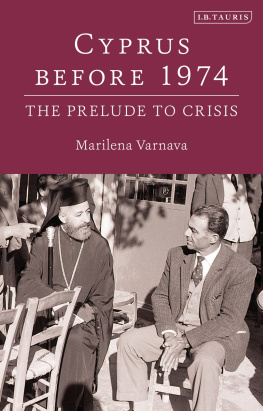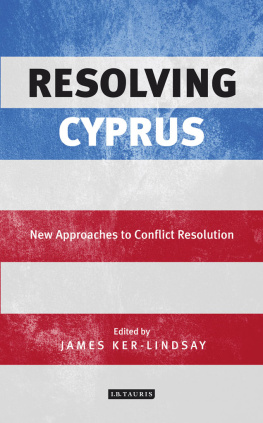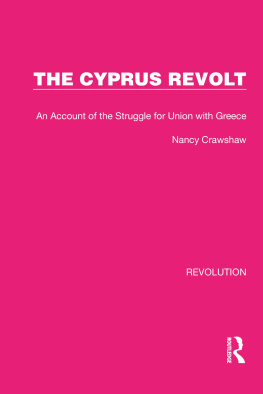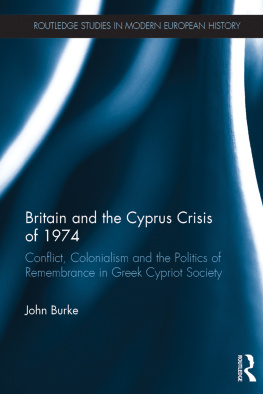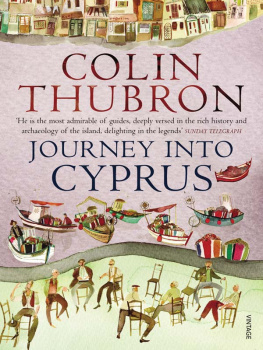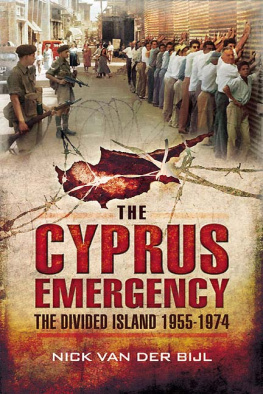Cyprus Before 1974
Cyprus Before 1974
The Prelude to Crisis
Marilena Varnava

This book is a result of my doctoral research at the Institute of Commonwealth Studies, School of Advanced Study, at the University of London. Undertaking this research and writing this book might have been a long journey, during which many times I felt that it might never come to fruition. However, this journey was a rewarding one. I was lucky to have by my side many individuals who gave me their unreserved support and their invaluable assistance and to all of them I would like to extend my gratitude.
First and foremost, I would like to express my deepest gratitude to my PhD supervisor, Professor Robert Holland, for patiently guiding me along the right paths during this very challenging yet utterly fulfilling journey. I am especially thankful for his priceless academic advice and his overall support that enabled me to grow not only as doctoral student but also as a young professional. Without his guidance, his valuable feedback and our long discussions about the Cyprus affairs at this cosy caf in Russell Square, in London, this book would have never been realized. Robert Holland, thank you for being a great mentor to me.
I would also like to express my appreciation to Professor Philip Murphy, director of the Institute of Commonwealth Studies, for his valuable contribution during the final and very critical stage of my PhD thesis preparation. Additionally, I would like to sincerely thank my viva examiners, Dr Klearchos Kyriakides and Dr Spyros Economides, who gave me valuable feedback and guidance, not only during the viva examination, but also after the completion of my doctoral research. I could not but thank my IB Tauris editor, Tomasz Hoskins, for his assistance and our very fruitful collaboration.
Many thanks to the staff of the Senate House Library, of the University of London, the National Archives of the United Kingdom in London, the Cyprus State Archives in Nicosia, the Library of Makarios III Foundation in Nicosia, the newspapers archive at the Public Information Office in Nicosia, and the Cyprus Development Bank archive in Nicosia.
It would not have been possible to complete this research without the immense support and love of my friends and family. I would like to thank each and every one of my friends and colleagues who encouraged and helped me to overcome any difficulties encountered along the way. Our endless discussions, our disagreements and our mutual concerns about the Cyprus problem were a true source of inspiration to me, motivating me to bring this project into life.
I am also grateful to Andria Ioannou for her selfless help with the manuscript. Likewise, I am deeply indebted to my sister, Alexia, who supported me in numerous ways during this research. My overwhelming thanks and love go to Nikos, who with his unconditional love and patience never stopped believing in me and giving me constantly strength and courage.
Last but foremost, words cannot express my gratitude to my parents, Varnavas and Pistoula, for their immense love, patience, as well as their moral and financial support that made everything possible during this long and rewarding journey of my life.
| AKEL | Progressive Party of Working People |
| CoE | Council of Europe |
| DoS | (US) Department of State |
| EDEK | Unified Democratic Union of the Centre |
| EOKA | National Organization of Cypriot Fighters) |
| GDP | gross domestic product |
| MP | member of the Parliament |
| NATO | North Atlantic Treaty Organization |
| PIO | Press and Information Office (Republic of Cyprus) |
| TCA | Turkish-Cypriot Administration |
| TCPA | Turkish-Cypriot Provisional Administration |
| TMT | Trk Mukavemet Tekilat Turkish Resistance Organization |
| TNA | The National Archives of the UK |
| UNFICYP | United Nations Force in Cyprus |
| UP | Unified Party |
In December 1963, only three years after the birth of the Republic of Cyprus, a violent, inter-communal clash abruptly terminated the already shaky co-existence of Greek-Cypriots and Turkish-Cypriots in the state apparatus of the island that had been envisaged in the 1960 Constitution. Thereupon, both communities leaderships set in motion their plans for consolidating separate administrations, making Cyprus a simmering cauldron which exploded ten years later, in July 1974. The purpose of this book is to explore the development of the Cyprus problem through the decade of 19641974 with a main focus on the goals and strategies, decision making and actions of the leaderships of the two main communities on the island.
It should be borne in mind that the Cyprus question, even before independence, had evolved through several phases closely entwined with the international context. The Cold War rivalries and the need of the West to keep Cyprus under its sphere of influence had inevitably affected the evolution of the Cyprus problem and exacerbated the internal rivalries within and between the two communities on the island. There is still a widespread perception, especially among Greek-Cypriots, that the islands fate was pre-determined according to the interests of the big powers and secret arrangements between Turkey and the junta in Greece. There are several theories and studies that seem to confirm this belief. This book, however, through extensive archival research, focuses instead on the primary and decisive contribution made by specifically Cypriot players to the evolution of the Cyprus problem and the events that led up to July 1974. Through this study several elements are distinguished, which explain the compelling motives that drove the two communal leaderships, and how these moulded the political context of Cyprus. It becomes evident that a lack of rational political evaluation of internal problems and the international context, wishful thinking and the consequent misperception of threats led to a self-fulfilling prophecy. This proved catastrophic for the peaceful co-existence of the two communities in Cyprus.
The main underlying cause of the islands fragile situation during the period under examination can be detected in the background that led to independence and the nature of the constitution of the new state. As a Therefore, both his personality and his policies are closely examined in this book.
Conversely, for the Turkish-Cypriot community things were very different. The lack of an experienced political leadership along with the isolation of a significant percentage of the Turkish-Cypriot community isolation within the enclaves after 1964 led to a constantly growing economic and military dependence on Ankara. It was only after April 1968, with the return from Turkey of the previously exiled Turkish-Cypriot leader Rauf Denktash, that it seemed Makarios would have to face a worthy political opponent. It should be stressed that although the Turkish-Cypriot community deeply relied on Turkeys diplomatic and economic aid, it was also true that it remained very much a distinctive entity, capable, albeit to a limited extent, of expressing its own views and positions.
The immediate background of this book begins with the adoption of the UN Security Council Resolution 186 on 4 March 1964, with which the UN peacekeeping force and the UN mediator were assigned to the island following the inter-communal crisis of December 1963. The resolution was in order, first, to maintain a peaceful status quo
Next page
